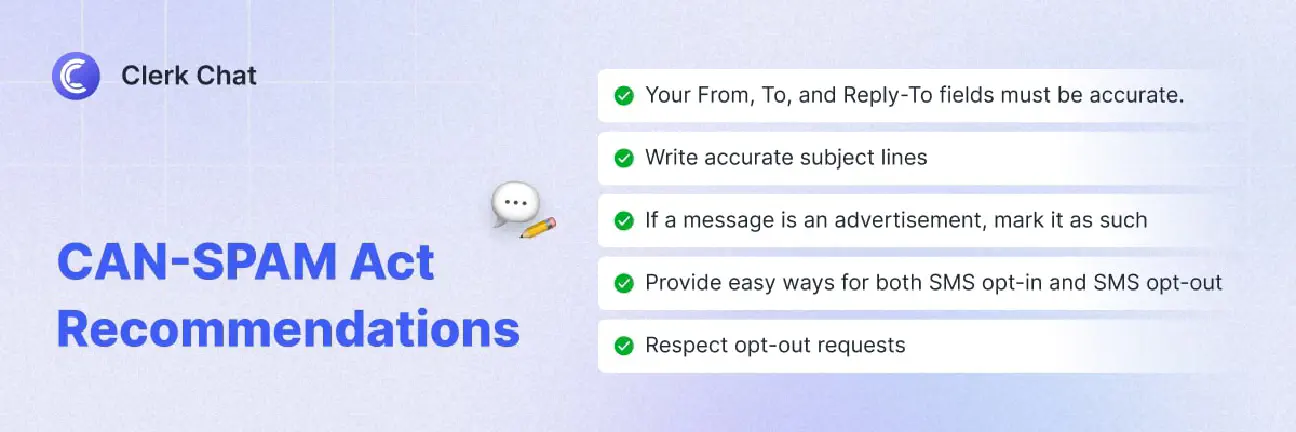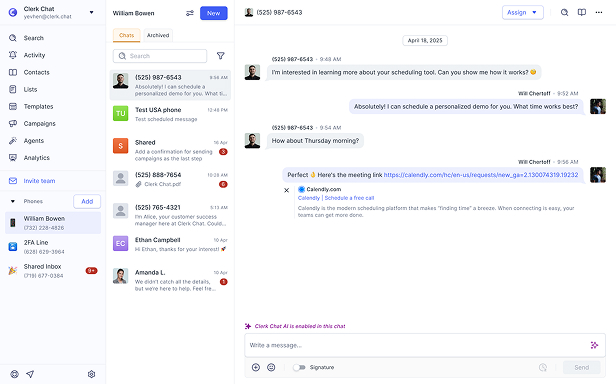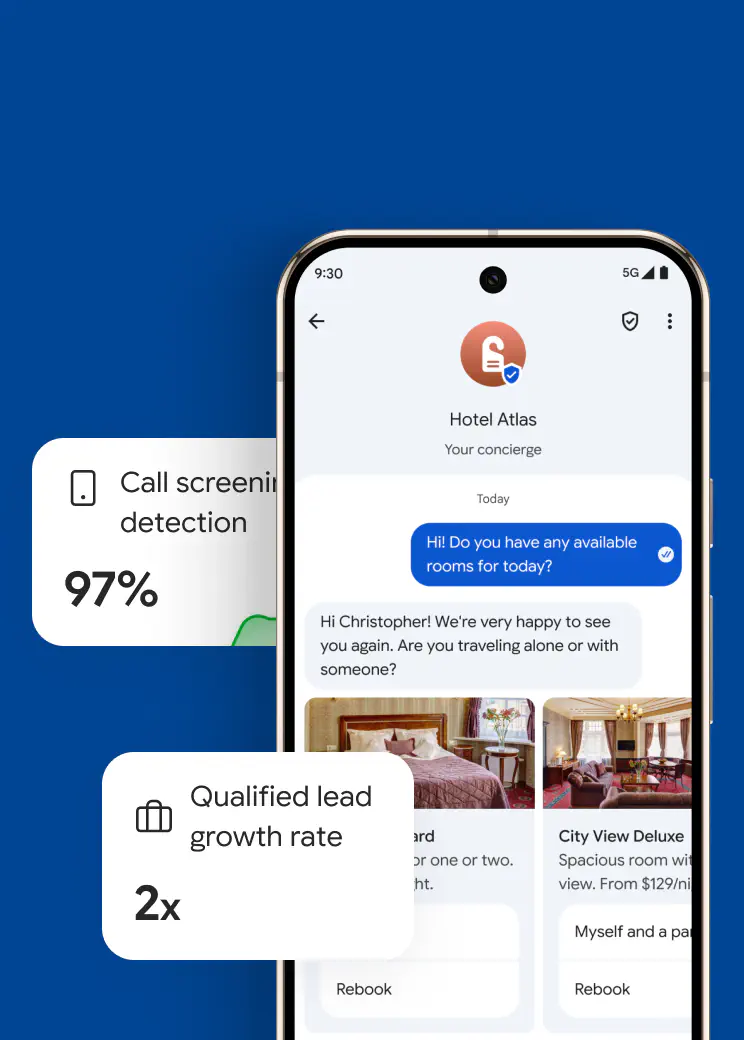CAN-SPAM Act Text Messages: The Ultimate Guide
By Team Clerk Chat
- Published: August 1, 2024
Free 10DLC Whitepaper
The CAN-SPAM Act is something most marketing teams are familiar with. First introduced into law in 2003, CAN-SPAM has influenced how companies send marketing materials to customers for years.
Unfortunately, there’s still a lot of confusion among some companies about what CAN-SPAM applies to. Notably, CAN-SPAM doesn’t just influence email communications. It applies to all commercial electronic messages. This means you need to consider CAN-SPAM regulations when you’re using conversational text messaging and AI automated messages for marketing.
Just like many other regulatory mandates, from the TCPA regulations to SEC text messaging rules, failure to comply with CAN-SPAM guidelines can lead to disastrous results.
Not only do you risk significant financial penalties, but the relationship you have with your customers, and your brand’s reputation could suffer too.
So, how do you ensure you’re CAN-SPAM compliant?
What is CAN-SPAM? The Basics
CAN-SPAM stands for “Controlling the Assault of Non-Solicited Pornography and Marketing.” It’s an act that was initially passed into law in 2003, with the intent of protecting customers from unsolicited electronic messages including email and texts.
The CAN-SPAM Act established the first national commercial email standards for US companies, and various other countries have adopted similar laws, such as the Canadian CASL Act.
The Federal Communications Commission outlines all the rules for CAN-SPAM compliance on its website. For the most part, however, the CAN-SPAM Act dictates that:
- Email or text communications can’t have false or misleading information in the header and subject lines cannot be deceptive in any way.
- All companies must make it clear that their marketing emails are intended to advertise goods or services.
- Messages must include contact details for the sender, so customers can get in touch with questions, or request to “opt-out” of receiving messages.
- There must be a clear and functioning opt-out option for customers, and all opt-out requests should be honored quickly.

Does CAN-SPAM Apply to Text Messages?
The CAN-SPAM Act applies to all commercial email and text messages sent to wireless devices. Although the Act was primarily intended to reduce email spam, it still applies to some types of text messages.
In particular, CAN-SPAM will apply to most of the automated promotional texts you send to customers. For instance, if you use a software solution like Clerk Chat to schedule SMS messages to promote new products or offers, you’ll need to be compliant with CAN-SPAM.
Notably, CAN-SPAM doesn’t apply to transactional text messages (like order confirmation messages). However, if a message you send includes both transactional and commercial content, the Act will still apply.
For instance, you might add a promotion to the bottom of an order confirmation email encouraging customers to purchase an additional product. This would transform the message into a “commercial” notification, which means you’ll need to follow CAN-SPAM rules.
The Penalties for Violating the CAN-SPAM Act
Most regulations that govern SMS compliance come with serious repercussions for violators, and the CAN-SPAM Act is no different. If you don’t comply with CAN-SPAM, the Federal Trade Commission (TCC) can fine your company up to $51,744 for each violation.
If your messages or emails violate other regulatory guidelines too, such as 10DLC rules, or TCPA regulations, you could face extra fines too.
It’s not just the potential cost of a violation that makes adhering to CAN-SPAM requirements so important. Ensuring you follow regulatory guidelines effectively shows your customers you value their privacy, and can improve your reputation in your industry.
How to Send CAN-SPAM Act Text Messages Safely
CAN-SPAM compliance can be trickier to master than it seems. It’s easy to make mistakes, like forgetting to include opt-out details when using an automated short code texting service. You may even miss important contact details in your texts.
Here are our top tips for avoiding hefty fines and reputational damage.
1. Learn About Texting Compliance
Before you start implementing strategies to ensure you’re complying with the CAN-SPAM Act, it’s worth remembering that there are various other compliance mandates that apply to text messaging too. For instance, if you’re investing in mobile marketing, you’ll need to ensure you’re thinking about A2P 10DLC compliance. Check our 10DLC registration guide for more information.
You’ll also need a comprehensive TCPA compliance checklist for SMS. Plus, you’ll need to think about how you’re saving, storing, and protecting archived text messages, based on the regulations specific to your industry. For instance, if you’re using SMS for healthcare promotional messages, there will be specific rules in place for how long you should retain records.
The good news is that most regulations will require you to implement similar strategies, such as obtaining consent to communicate with customers through SMS opt-in methods, and ensuring stored data is adequately protected. However researching which mandates apply to your company should ensure you can implement a comprehensive strategy.
2. Have a Comprehensive Opt-In Strategy
Regardless of what kind of commercial messages you’re sending to customers, it’s always a good idea to have a comprehensive opt-in strategy. Although CAN-SPAM doesn’t require companies to obtain consent before sending messages to customers, it does require you to honor “opt out” requests, which means using opt-in strategies is a reliable best practice.
Plus, ensuring you obtain explicit consent from customers to communicate with them via a “text to join” campaign or online form will help you adhere to other regulations, like the TCPA.
As an added bonus, ensuring you get consent to send messages to customers means you know you’re communicating with people who actually want to hear from you. This reduces your risk of wasting time and money on reaching out to the wrong audience.
Once you obtain consent to communicate with customers, make sure you record their opt-in details. Store opt-in messages alongside archived text messages on platforms like Global Relay or Smarsh. This should help you protect your business in the case of any legal disputes.
3. Include Clear Identification
The CAN-SPAM Act requires all companies to include contact details in promotional messages to ensure their customers can get in touch with them, whenever necessary. This means you shouldn’t be sending messages from a withheld number or failing to include other details customers can use.
It’s also recommended to clearly identify your business in each message. For the best results, use an A2P 10DLC messaging number, registered with the right authorities.
Aside from identifying your business and contact details in each message, you’ll also need to ensure you’re clearly explaining what the message is for and what it’s about. CAN-SPAM requires all companies to make it clear that the message they’re sending is for promotional purposes.
You also need to be clear and direct about what the message includes in any preview text or headings, so don’t try to mislead customers. For instance, you can’t send a message advertising your new service with a subject line like “Details About Account Security.”
4. Maintain Comprehensive Records
Notably, CAN-SPAM guidelines don’t actually include a lot of information encouraging companies to retain comprehensive records. However, ensuring you do have records of opt-in information, customer data, and your messages will help you to avoid problems in the future.
Using a tool like Global Relay to capture all communications from different channels, including SMS, email, voice, and more will ensure you can respond promptly to any requests for information from regulatory bodies. It will also help you comply with specific regulations relevant to your industry.
For instance, messages archiving for the financial industry is particularly important for avoiding fines. Record-keeping can be valuable in other ways too.
The ability to search through your archived chats on WhatsApp, SMS channels and more can help you to surface important information about your customers, their preferences, and their needs. This can help you build more effective and personalized marketing campaigns in the future.
5. Manage Opt-Outs Effectively
Finally, ensure it’s easy for customers to “opt-out” of receiving messages from you on any device or channel. CAN-SPAM requires all companies to have a visible and easy-to-follow opt-out process, which they refer to in every commercial message.
Notably, you’ll need to ensure you honor opt-outs promptly. Which means you shouldn’t be messaging customers after they “unsubscribe” to try and convince them to change their mind.
However, you can consider offering customers the option to “opt down,” rather than opting out. This means giving your subscribers access to a preference center where they can choose which types of messages they want to receive or how often they want to hear from you.
Mastering CAN-SPAM Act Compliance with SMS
The CAN-SPAM Act is just one of many regulatory mandates companies need to be aware of when using text messages to communicate with customers and to promote products or services. Whether you’re investing in an SMS service for financial industries, and sending automated messages to customers about new products or promoting retail deals with SMS, compliance is crucial.
Fortunately, avoiding fines and reputational damage doesn’t have to be complicated. All you really need is the right opt-in and opt-out strategy, an archiving solution like Smarsh or Global Relay, and an effective approach to SMS security.
At Clerk Chat, we make managing text messaging compliance simple. Not only does our solution integrate with the best archiving tools on the market, but it enables companies to set their own rules and policies for data protection, automate campaigns with specific triggers, and protect communications with end-to-end security.
Make SMS compliance simple. Request a demo of Clerk Chat today.
In this article:
Ready to use your business number for text messaging?
Thousands of businesses are already experiencing the power of conversational messaging through SMS. Join us. Free trial and paid tiers available.
Get Started#Subscribe
Get product updates in your inbox
Tutorials, features, and Clerk Chat news delivered straight to you.



